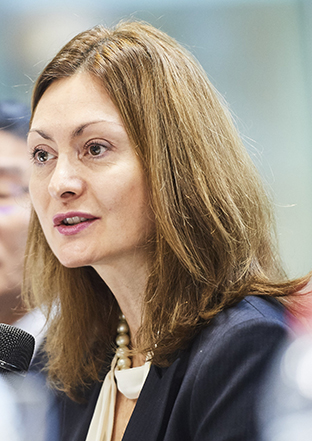Anna Athanasopoulou, Head of Unit of Proximity, Social Economy and Creative IndustriesEuropean Commission
During the time of the pandemic, the demand for social economy has never been greater. Social economy organisations have been a trusted partner, operating at the forefront of the crisis to address urgent sanitary and social needs.
I personally heard how much solidarity and creativity many of them have shown during the past months, from helping to step up production of medical equipment to adapting to the new reality. Such success stories should however not make us forget that many actors in the field were strongly hit by the crisis. Many lost customers, were now more financially fragile or even worse, had to close their activities.
The COVID-19 crisis also requires to ‘rebuild better’. It has exposed our vulnerabilities calling for a rethink of how economic and social activities are organised.
The 2030 Agenda recognizes that a holistic approach is needed and that business-as-usual is no longer an option. In order to realize the SGDs, it is crucial to look at alternative development strategies and emerging economic models. Social Economy models can play this role by promoting inclusive and sustainable development through concrete social, institutional and technological innovations and practices.
Today, it is high time to look beyond the crisis we are facing to work on building a fairer, more prosperous and stronger society. Social economy is an excellent example of an “economy that works for people”. It helps build a social Europe, turning the European Pilar of Social Rights principles intoactions with concrete results for citizens. Social economy actors are best suited to support the ambitious agenda agreed between European leaders in Porto, to shape the future of social rights in Europe.
We also need to boost sustainability that is at the heart of the Commission’s agenda, making the green and digital transitions socially just. The magnitude of the crisis makes it more urgent to adapt our priorities, our way of living and consuming, and to have a greater sense of the collective interest.
In order to succeed, we have to recognise and tackle barriers that still hamper social economy organisations and social enterprises to grow and flourish. We also need to help them become a pillar of our transformation into a greener economy fit for the digital age.
In a few words, we must turn the big challenges we face into opportunities.
The European Commission will release an Action Plan in the coming weeks that will seek to boost enabling conditions for the social economy across Europe. We will help Member States create more jobs and sustainable growth, accessible services, foster up-skilling, boost industrial transformation, address environmental challenges or strengthen communities, in particular at local level.
We will build on the experience gained from the 2011 “Social Business Initiative” and its follow-up under the 2016 “Start-up and Scale-up” initiative.
We also need to have a vision for the social economy and its place in industrial transformation. Early May 2021, the European Commission updated its Industrial strategy and introduced a new approach based on 14 industrial ecosystems, gathering public and private actors, large and small companies connected along value chains in different Member States. Among them, the ecosystem “Proximity, Social Economy and Civil Security”.
Our Annual Single Market Report 2021 already presents a first analysis of the multiple challenges faced by these 14 industrial ecosystems as they have been identified. It also highlights some of the transformative initiatives already undertaken to achieve the twin green and digital transition and increase resilience.
These analyses will serve to co-create transition pathways for the different ecosystems. Such pathways will offer a better bottom-up understanding of the scale, cost, long-term benefits and conditions to prepare actions helping each ecosystem to tackle our forthcoming societal and economic challenges.
We must continue to work in partnership with all stakeholders to be successful, co create policy-making that will be impactful to get through this crisis and keep pace with the ongoing transformations.
The European Social Economy Summit, that we jointly organized with the City of Mannheim in Spring this year, is a brilliant example of this co-creation process. It made clear that entrepreneurs and innovators active in social economy could drive this ambition forward. The Summit showcased experiences and best practices among more than 3000 participants which also delivered a clear message for action via the Mannheim Declaration.
I am firmly convinced that the social economy story is a good one and can drive the vitality and inspiration we need to build our green, digital and resilient future. It is a vector that will help “transform” our society by implementing innovative and value-driven economic practices and models that are built around a social purpose or citizen-based.
Let the potential of the social economy be fully acknowledged and exploited!







